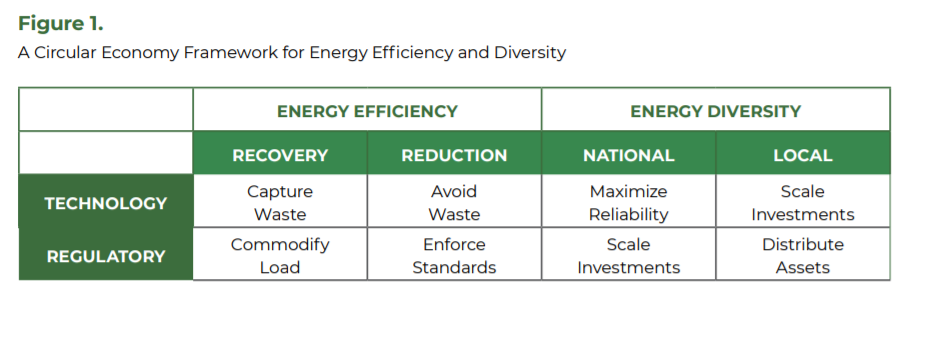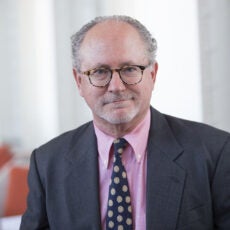Efficiency and Diversification: A Framework for Sustainably Transitioning to a Carbon-Neutral Economy

Presenting a framework for adopting circular economy approaches to increasing energy efficiency and diversity, this paper outlines exemplary projects in several cities.
This paper is republished with the permission of the U20 Taskforce.
Executive Summary
Presenting a framework for adopting circular economy approaches to increasing energy efficiency and diversity, this paper outlines exemplary projects in several cities. In addition, it surveys implementation efforts spanning monitoring, capacity building, and financing. It discusses needed research and concludes with policy recommendations to be brought to the attention of G20 members. Appendix contain detailed relevant case studies from Mexico, Rome, and Amman.
Background
Energy efficiency and diversification is an issue of great concern for the G20. In the previous two G20 convenings, Leaders’ Communiques have acknowledged the importance of enhancing the transformation of energy systems into affordable, reliable, sustainable, and low GHG emissions systems as soon as possible. At the urban level, in the 2019 Tokyo U20 Declaration, Mayors committed to decarbonizing the energy grid, with 100 percent renewable electricity by 2030, and 100 percent renewable energy by 2050. As part of the 2018 Buenos Aires U20 Communique, Mayors committed to supporting policies to achieve the objectives of the Paris Agreement and accelerate a global shift away from fossil fuels toward clean, renewable energy. These commitments included adoption of carbon pricing that reflects the social cost of carbon, increasing investment in climate solutions, reduction or removal of fossil fuel subsidies, and other measures as appropriate.
While cities are largely dependent on, and shaped by, the regulations and technologies of national and global markets, they play powerful roles in implementing national strategies in several key areas.
Introduction
The fundamental basis for energy efficiency is found in the very notion of “circular.” Energy efficiency is not just a characteristic of energy production and energy consumption, but of the interaction between these two sides of the equation. In simplest terms, the avoidance and recovery of waste is the essence of energy efficiency. The fundamental basis for energy diversification is likewise found in the very notion of “Carbon-neutral”. Fossil fuels are extraordinarily energy dense, transportable, and storable. They have created an economy built on reliability and continuous energy provision. A Carbon-neutral energy system, however, must be built on a diverse system of interacting sources in order to meet the economy-scale demands for energy in the modern world. Together, these fundamental realities place increasing energy efficiency and diversification at the very center of any circular, Carbon-neutral economy. It is, indeed, priority number one, on which other priorities depend.

Cities represent a key implementation platform for the circular, Carbon-neutral economy. This platform operates at the nexus of market and policy processes, operating both within and far beyond the jurisdiction of these cities. This whitepaper identifies several key capacities needed to empower cities to fulfill their potential roles as both actors and a platform for implementation of the circular, Carbon-neutral economy. It presents a framework for identifying the urban role in promoting energy efficiency and energy diversification (See Figure 1). The framework presents city programs categorized into either technology or regulatory challenges arrayed against opportunities specific to either energy efficiency or energy diversity. This typology of city programs demonstrates the critical capacities necessary for successful implementation. The paper concludes with suggestions for additional research to fill gaps in knowledge about this subject.
This white paper has three parts and an appendix: Part One Challenges and Opportunities discusses the framework and issues related to its implementation. Part Two Recommendations suggests policies needed to execute the framework discussed in Part One, and Part Three References offers key sources to pursue this subject in depth. The attached Appendix provides detailed case studies.
Mark Alan Hughes
Director EmeritusMark Alan Hughes is director emeritus of the Kleinman Center. During his time as faculty director, he led the Center and wrote on topics ranging from deep decarbonization to the future of Philadelphia’s energy landscape.
Cornelia Colijn
Executive DirectorCornelia Colijn is the executive director of the Kleinman Center. She envisions, plans, and manages all center programming, while building connections with students, faculty, and leaders in the energy industry.
Oscar Serpell
Deputy DirectorOscar Serpell oversees all student programming, alumni engagement, faculty and student grants, and visiting scholars. He is also a researcher, writer, and policy analyst working on research initiatives with students and Center partners.



